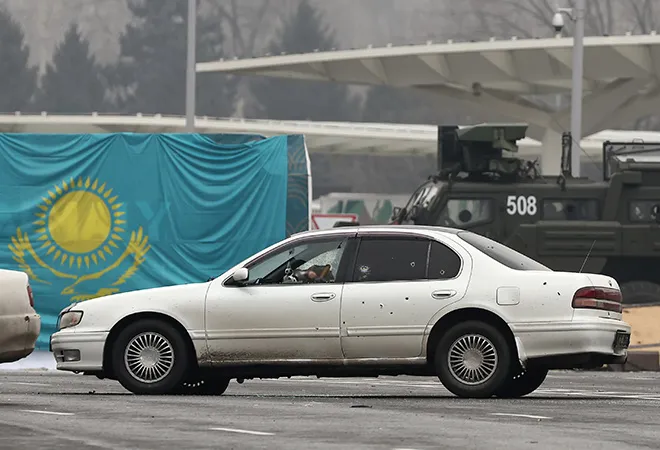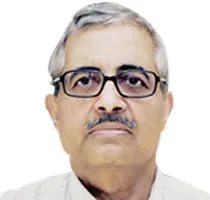
Kazakhstan appears to be limping back to normal as the government takes control of law and order after thousands of angry protesters took to the streets, provoked by the doubling of Liquefied Petroleum Gas (LPG) prices. In the worst violence since Kazakhstan’s independence, demonstrators clashed with armed forces, torching government buildings, police vehicles and toppling statues.
The President, Kassym-Jomart Tokayev, walked back the price increase, dismissed the cabinet of ministers and promised swift implementation of some welfare measures but the protests grew into demonstrations of disenchantment against the long rule of nearly 30 years by former President, Nursultan Nazarbayev, who stepped down in 2019. People chanted “Shal Ket!” (“Old man, go!”) at demonstrations across the country. Although he stepped down from the Presidency, Nazarbayev remained the head of the all-powerful National Security Council (NSC) and several of his family members continued to hold important government positions.
As the violence spread, Tokayev dismissed Nazarbayev as head of the NSC and Nazarbayev’s family members from the government, bringing the Nazarbayev era to an end, which was till now associated with stability and development in the largest Central Asian country, the approximate size of Western Europe. Nazarbayev, however, has rallied for unity around Tokayev amidst the widespread protests.
The surprisingly large-scale protests were primarily propelled by the participation of the middle-class which was worst hit by the LPG price rise because this is an important vehicular fuel in Kazakhstan. While the LPG price rise was the trigger, the underlying causes for mass support were the adverse economic prospects in the past few years, visibly growing social inequalities, and resentment against the amassing of political power and economic wealth by the Nazarbayev family and coterie.
President Tokayev has accused the protesters of being ‘foreign-trained terrorists’ who are financially motivated to be coup-plotters. Although the President declared on 7 January that constitutional order was largely restored, the security forces have been permitted to “fire without warning”. The interior ministry has so far confirmed the deaths of 18 security officers and 26 ‘armed criminals’. Additionally, there were 353 injured.
Tokayev’s decision to invite troops from the Russia-led Collective Security Treaty Organisation (CSTO) to protect vital installations is indicative of the scale of the violence and the dangers it posed to the regime’s continuity.
Domestic significance
Despite Kazakhstan being regarded as an example of economic stability in a region that has been fraught with uncertainties, widespread economic disparity prevails in the country. The government’s statistics indicate that the average salary in the country is equivalent to US $570 a month, but a vast majority of people earn far lesser than this, according to The New York Times. The per capita income was around US $9,000 in 2020, according to the World Bank. For an economy dependent on hydrocarbon exports, the fluctuating oil prices and the coronavirus pandemic has had a negative impact, reducing people’s living standards, especially of the middle classes.
Moreover, for years, Kazakhstan has attracted substantial foreign direct investments owing to the perception of being the most economically and politically stable country in the region. With the current political instability, these investments could be hard to come by, thus, adding to the government’s and people’s woes.
The authoritarian nature of the Kazakh regime and the seemingly messy process of handing over of power by Nazarbayev had led to, what many observers felt, a duality of power centres, further fuelling public resentment against Nazarbayev and his family. Tokayev is seen as a close ally of Nazarbayev’s, elected without much political opposition. This will, at least initially, complicate matters for him, leaving considerably less manoeuvring space given that he is not the most charismatic leader and that there is substantial public ambivalence about him.
Meanwhile, President Tokayev has promised to establish a public forum that would address the people’s grievances over a gamut of issues, ranging from economic inequality and the political culture to human rights. The former head of the National Security Committee, Karim Masimov, has also been arrested on charges of treason, probably to signal to the protesters that Tokayev is serious about punishing the excesses of the previous regime. But currently, there seems to be a deep sense of mistrust amongst the masses despite a slew of concessions. This points further towards the deep-rooted nature of the Kazakh people’s discontent with the governmental authorities that could be challenging to contain.
What the situation means for the world?
The primary implications pertain to the fluctuating prices of oil and uranium. Kazakhstan accounts for roughly 40 percent of global uranium supplies and contains roughly 30 billion barrels (3 percent) of global oil reserves. In the wake of protests, uranium prices rose by roughly 8 percent over the day on 7 January, increasing from US $42 dollars to US $45.25 per pound. Similarly, oil prices also increased about 2 percent on January 6, before settling slightly lower the next day. The continually destabilsing situation would largely affect supplies and prices, also prompting import-dependent countries to look for alternate suppliers of these fossil fuels.
Unlike most other countries, Russia also has additional stakes in the situation as it shares a 7,600-kilometre-long border with Kazakhstan, which has virtually no border control since both countries are members of the Eurasian Economic Union. Therefore, in case the unrest bolsters any kind of regime change in the country, it could easily impact relations with Russia. Nationalists coming to power could see discrimination growing against the 3.5 million strong Russian minority in Kazakhstan, which comprises 20 percent of the population. If radical elements capture power, Russia would be scrambling to ensure that it doesn’t spill across the border.
These concerns probably explain the alacrity with which the CSTO responded to Tokayev’s request for forces to stabilise the situation. The presence of CSTO troops in Kazakhstan will also probably significantly impact Kazakhstan’s till now multi-vector foreign policy.
What the situation means for India?
Recognising its strategic importance, in the last few years, India has been trying to lay more emphasis on building a robust relationship with Central Asia through bilateral dialogues and exchanges, exchange of high-level visits, extension of credit etc. In a first, Presidents of all the Central Asian Republics are also expected to visit India as Chief Guests for the Republic Day Parade on 26 January 2022. But, with the chaotic political situation in the country, it is unclear whether the Kazakh President would be able to join.
Furthermore, under normal circumstances, India would not have any direct stakes in this situation. However, in cognizance of recent geopolitical developments which could render India’s strategic relations with Central Asia extremely crucial to responding to the Afghan situation, India would consider any instability in Central Asia as unfavourable. The only silver lining for India in the situation in Kazakhstan is that it will possibly complicate China’s plans for Central Asia.
The views expressed above belong to the author(s). ORF research and analyses now available on Telegram! Click here to access our curated content — blogs, longforms and interviews.




 PREV
PREV



